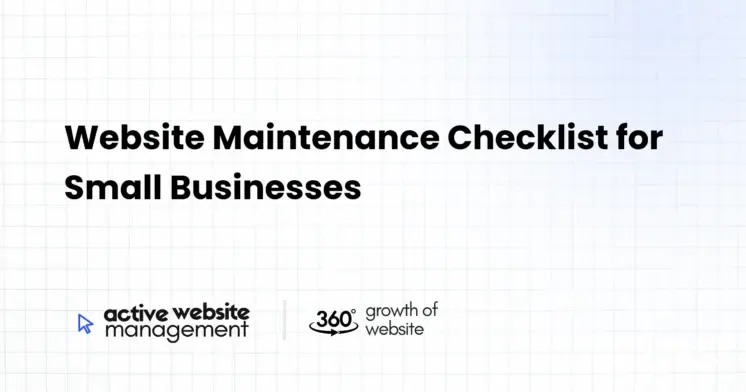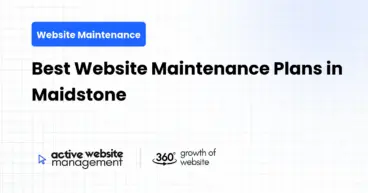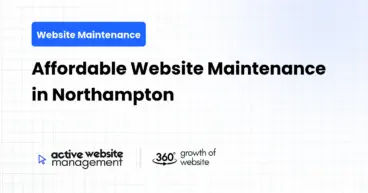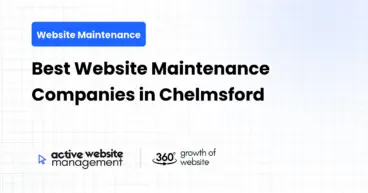January 6, 2025
4 min read
Introduction to Website Maintenance
Every small business owner knows the importance of a strong online presence. However, it’s not just about having a website—maintaining it is crucial. Regularly ensuring your site runs smoothly helps you avoid potential pitfalls and guarantees a seamless user experience. This checklist will guide you on essential website maintenance tasks crucial for small businesses.
The Importance of Website Maintenance
Why is Website Maintenance Important?
Enhances User Experience: Regular updates and checks ensure your site is easy to navigate, engaging, and error-free. A well-maintained website retains visitors and can convert them into customers.
Boosts SEO: Frequent updates improve your site’s ranking on search engines. Google values active sites that offer fresh and relevant content.
Increases Security: Outdated websites are vulnerable to security breaches. Maintenance includes installing updates that protect your site from cyber threats.
Ensures Functionality: Regular maintenance helps identify and fix broken links, slow load times, and other issues that can deter visitors.
Essential Website Maintenance Tasks
Don’t Just Maintain Your Website—
Grow It using Active Website Management! Don't Wait for Growth—Accelerate It with Active Website Management
Monthly Maintenance Checklist
Software Updates: Regularly update your website’s software, including any content management systems or plugins, to enhance security and performance.
Backup Your Site: Perform a full backup of your website to ensure data recovery in case of a cyber-attack or other emergencies.
Check for Broken Links: Use online tools to identify and repair broken links to prevent frustrating your audience and harming your SEO.
Test Website Speed: Use tools like Google PageSpeed Insights to assess and optimize your site’s loading speed. Slow websites drive potential customers away.
Update Content: Refresh blog posts, update business information, and ensure product descriptions are current to keep your audience informed and engaged.
Quarterly Maintenance Checklist
Review SEO: Analyze your current SEO strategy. This includes keyword performance, meta tags, descriptions, and more. Ensure your SEO targets align with your business goals.
Conduct a UX Audit: Consider using heatmaps or user session recordings to optimize user experience.
Mobile Responsiveness Check: With an increase in mobile users, ensure your website is mobile-friendly, providing a seamless experience across all devices.
Security Audit: Conduct a thorough security review, including testing forms, checking user permissions, and updating security patches.
Annual Maintenance Checklist
Revise Overall Design: Assess whether your site’s design is outdated or if it aligns with current web standards and trends.
Audit Content: Perform a thorough content audit to determine what information is still relevant, what needs updating, and what can be repurposed.
Evaluate Hosting Plans: As your business grows, ensure your current hosting plan meets your needs. Consider scalability, speed, and support.
Legal Compliance Review: Ensure your site complies with the latest regulations like GDPR or accessibility standards.
Website Maintenance for SEO
Integrating small business SEO best practices into your maintenance routine is essential. Here are some tips:
Small Business SEO Integration
Keyword Optimization: Continuously research and update the use of keywords throughout your site, focusing on primary areas like titles, headings, and body content.
Create Quality Content: Regularly update your blog with high-quality content that addresses your audience’s needs and questions.
Improve Metadata: Your site’s titles and descriptions should always include key phrases that potential customers are searching.
Build Internal Links: Internal linking boosts SEO by allowing users to navigate your site easily and helping search engines index your pages.
Use Alt Text for Images: Ensure all images have descriptive alt text for better accessibility and SEO.
Practical Website Maintenance Tips
Automate Where Possible
Automation tools can handle routine maintenance tasks like backups and SEO monitoring. This saves time, reduces human error, and ensures consistency.
Use Analytics
Google Analytics provides insight into visitor behavior, helping you understand what’s working and what needs improvement. Use this data to track key performance indicators like bounce rates, average session duration, and conversion rates.
Active Website Management
For hands-off website maintenance, consider hiring professionals like Active Website Management. They offer comprehensive services tailored for small business needs, including backup, security checks, updates, and performance improvements.
Don't Wait for Growth—Accelerate It with
Active Website Management Don't Wait for Growth—Accelerate It with Active Website Management
Benefits of a Well-Maintained Website
Trust and Reputation: A well-functioning, regularly updated website fosters trust among users.
Competitive Edge: In a crowded market, a fast, reliable, and secure website can differentiate your business from competitors.
Cost Efficiency: Regular maintenance prevents costly repairs or redesigns in the future by addressing issues before they escalate.
Conclusion
Maintaining a website is an ongoing process that is critical to your business’s online success. This checklist provides a comprehensive guide to ensuring that your website remains a vital tool for marketing, engagement, and sales. By incorporating monthly, quarterly, and annual maintenance tasks into your routine and leveraging services like Active Website Management, you can create an online presence that not only attracts but retains your target audience.







